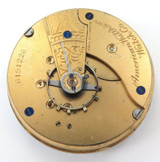Description
1894 Waltham 18S 7J Lever Set Mens Pocket Watch Movement & Dial.
Unable to fully test as missing the winder & winding stem, balance & balance wheel are ok though balance wheel is slightly stiff, good clean movement, it may need at least a service, has sat idle for years. 1894 Waltham, Grade No. 1, Model 1883, 7J, 18S, lever set, stem wind with date serial number 6151226. The dial plate is approx 40.5mm in diameter. Good dial, just needs a clean, winder located at 3, lever just after 5.
Always happy to combine postage where possible & practical. HNCO are not responsible for import duties or customs charges. This is the buyers / importers responsibility.
~~~~~~~~~~~~~~~~~~~~~~~~~~~~~~~~~~~~~~~~~~~
HNCO is one of the leading sellers of Pocket watches on eBay Australia, with over 100+ Pocket watches on offer. We are constantly adding to our ever increasing range and have a large assortment of American Railroad Grade Pocket Watches.
American Railroad Pocket watches were amongst the highest grade watches made, having been made for the railways makes them a great choice to use every day, mainly for their durability over time. Their lower production quantities and of course their high grade movements make them also a great gift or investment.
A typical railroad's requirements for a pocket watch in the early 20th century might include:
* Only American-made watches may be used (depending on availability of spare parts).
* Only open-faced dials, with the stem at 12 o'clock.
* Minimum of 17 functional jewels in the movement.
* Size 16 or 18 only.
* Maximum variation of 30 seconds (approximately 4 seconds daily) per weekly check.
* Watch adjusted to at least five positions: Face up and face down (the positions a watch might commonly take when laid on a flat surface); then crown up, crown pointing left, and crown pointing right (the positions a watch might commonly take in a pocket). Occasionally a sixth position, crown pointing down, would be included.
* Adjusted for severe temperature variance and isochronism (variance in spring tension)
* Indication of time with bold legible Arabic numerals, outer minute division, second dial, heavy hands.
* Lever used to set the time (no risk of inadvertently setting the watch to an erroneous time, when winding the watch with the stem)
* Breguet balance spring
* Micrometer adjustment regulator
* Double roller escapement
* Steel escape wheel
* Anti-magnetic protection (after the advent of diesel-electric locomotives)
The minimum requirements were raised several times as watch-making technology progressed, and the watch companies produced newer, even more reliable models. By WW2, many railroads required watches that were of a much higher grade (as many as 23 jewels, for example) than those made to comply with the original 1891 standard.
_gsrx_vers_1677 (GS 9.8.1 (1677))










